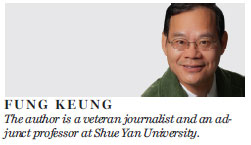AIIB should look to SAR for skilled staff
Updated: 2015-04-20 09:18
By Fung Keung(HK Edition)
|
|||||||||
About 60 countries and regions have agreed to join the Beijing-led Asian Infrastructure Investment Bank (AIIB). The bank is expected to publish its rules of administration by June 30 and become fully operational by the end of 2015.
The bank needs to recruit skilled staff to develop strategies and manage routine business such as evaluating infrastructure projects. Beijing should look no further than Hong Kong when searching for such skills. The SAR has a large pool of financial, engineering and political experts. More importantly, Hong Kong people can communicate easily in English with overseas members of the AIIB.
AIIB officials have indicated that the bank will recruit from worldwide. Beijing has promised not to fill the ranks of the bank's management with mainland officials. No doubt Asian and Western countries have considerable talent pools, but such experts may not have Beijing's interests at heart. In contrast, most Hong Kong people are patriotic.
The establishment of the AIIB will no doubt undermine the dominance of the World Bank and the International Monetary Fund, institutions greatly influenced by the United States. The advent of the AIIB signals a geopolitical eastwards power shift. Political issues must be handled sensitively. Fortunately, Hong Kong's eight universities have established dozens of think-tanks and research centers specialized in the analysis of international and Asian affairs. For instance, Hong Kong Baptist University has a European Union Academic Programme (EUAP) which specializes in European issues.
Southeast Asia's infrastructural project funding needs are estimated to be about $800 billion a year. Hong Kong's financial and banking experts can negotiate with AIIB's European and English-speaking member states to obtain such funding. Of course, I am not saying Europe has no such experts. Hong Kong people will usually balance the interests of China and those of Western countries which have joined AIIB. I am not sure whether a French employee of AIIB would put China's national interest ahead of France's.
There is no denying that appointing Hong Kong people to AIIB's management, think tanks and junior positions is analogous to nepotism - or offering jobs to one's family members. What about accusations of cronyism? This is not a problem. Worldly people realize Hong Kong is free of corruption. Hong Kong people employed by AIIB will be unlikely to turn a blind eye to unfair or problematic dealings among member states.
Another advantage of using Hong Kong people is the city's proximity to the mainland. In order not to leak sensitive information, mainland officials could meet Hong Kong bank employees in person in Shenzhen (hence no electronic devices would be involved). This is a city that Beijing officials can visit in two or three hours. Shenzhen borders Hong Kong.
I make no apology for promoting Hong Kong. This region has many talented people, educated locally or in the West. They could fill senior and junior positions at the AIIB. Should there be any conflict of interest, potential foreign employees of the bank would protect their own countries' interests, not China's. Hong Kong people's interests are in line with Beijing's. This is why I am sure skilled Hong Kong people have much to offer the AIIB.

(HK Edition 04/20/2015 page10)